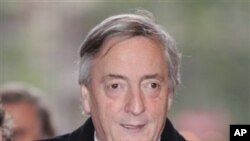Former Argentine President Nestor Kirchner has died at age 60. The husband of current President Cristina Fernandez de Kirchner died after suffering a heart attack in the southern city of El Calafate. Nestor Kirchner presided over Argentina's recovery from a severe economic crisis and backed those seeking justice for human rights violations committed during military rule.
When Nestor Kirchner became president in 2003, Argentina had endured three years of gut-wrenching economic chaos, marked by runs on banks, the collapse of the national currency, default on Argentina's foreign debt, harsh government-imposed economic controls, and massive street riots.
To make matters worse, Mr. Kirchner arrived in office with a shaky electoral mandate. Having received less than 25 percent of the vote in the general election, he avoided a run-off when his main challenger, former-President Carlos Menem, bowed out of the contest.
"Nestor Kirchner confronted a terrible economic crisis. And he also confronted a situation where he had some 22-percent support. So he had to resolve an economic crisis and also build political support to be able to govern effectively," said Inter-American Dialogue president Michael Shifter.
A former governor of Argentina's sparsely-populated Santa Cruz province, Mr. Kirchner belonged to the party of two-time President Juan Domingo Peron. Determined to stabilize a floundering economy, Mr. Kirchner heaped scorn on the neo-liberal policies pursued by many Latin American governments in the 1990s with the backing of the International Monetary Fund. Here is a portion of a speech he delivered at the 2005 Summit of the Americas in the Argentine resort town of Mar del Plata.
Mr. Kirchner said the so-called "Washington Consensus" has generated ample evidence of the failure of such [neo-liberal] policies. He said that Latin America in general and Argentina in particular are prime examples of the destructiveness of the theory of trickle-down economics.
Mr. Kirchner restructured Argentina's foreign debt, encouraged agricultural exports, and boosted foreign currency reserves. Argentina logged vibrant economic growth of 8 percent or higher in each of the four years he was in office.
He also reshuffled Argentina's Supreme Court and backed judicial reform, facilitating the prosecution of dozens of figures from Argentina's past military dictatorship for human rights abuses.
Despite these actions, the late President Kirchner was no ideologue, according to Johns Hopkins University Latin America expert Riordan Roett. "Nestor Kirchner was a pragmatic populist. What played well with the Peronist majority is what got done in Argentina. He was very good at marginalizing many of his potential opponents. It was all about opportunism and populism," he said.
Whatever his governing style, Mr. Kirchner's administration seemed to receive the ultimate validation in 2007, when Argentina elected his wife, Cristina Fernandez, to succeed him as president. Riordan Roett says, even as "First Husband", Mr. Kirchner continued to exert tremendous influence.
"A large part of the Nestor Kirchner program was to get his wife elected, which, of course, he successfully did. The issue now becomes whether 'La Senora' [Cristina Fernandez] is going to be able to build enough support, which she does not have now, for a second term next year," Roett said.
Until his death, Mr.Kirchner had been considered a likely contender for the 2011 presidential race, taking back the reins of power he handed to his wife in 2007.
Leaders around the world have sent condolences to Argentina and President Fernandez de Kirchner.
In a statement, U.S. President Barack Obama said Mr. Kirchner had played a significant role in Argentina's political life.
Former Argentine President Nestor Kirchner Dies




